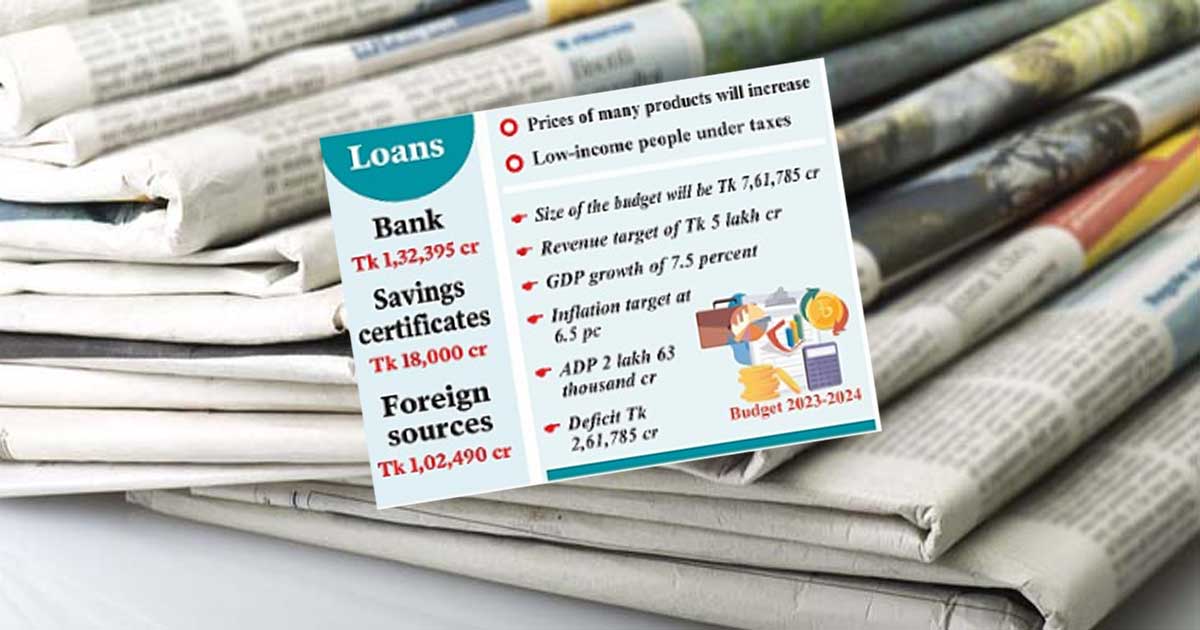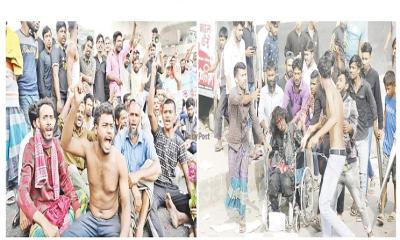Size of the budget will be Tk 7,61,785 cr
Prices of many products will increase
Low-income people under taxes
-
Revenue target of Tk 5 lakh cr
-
GDP growth of 7.5 percent
-
Inflation target at 6.5 pc
-
ADP 2 lakh 63 thousand cr
-
Deficit Tk 2,61,785 cr
The global economy is in turmoil in the post-Corona war situation. It has affected the country, and there is high inflation, pressure on foreign exchange reserves, liquidity crisis in the banking sector.
The government is not looking at an alternative to foreign loans to recover from such a situation. Therefore, the budget of the new fiscal year has been prepared keeping in mind the conditions of the International Monetary Fund (IMF). Finance Minister AHM Mustafa Kamal will present the budget for the fiscal year 2023-24 in parliament today. It is likely to be passed on June 26 after a long discussion as a proposed budget. It will come into effect from July 1.
According to finance ministry sources, the size of the budget presented by the finance minister in Parliament today for the new fiscal year will be Tk 7,61,785 crore. This is Tk 1,01,278 crore more than the current revised budget. To implement this mega budget, the target of income has been set at Tk 5,03,900 crore. To achieve this, it will have to earn an additional income of Tk 67,637 crore over the financial year 2022-23.
This time the deficit budget (including grants) will be Tk 2,57,885 crore. It has been kept at 5.2 percent of GDP for the new fiscal year. And without grants, the deficit will be Tk 2,61,785 crore. In line with the current budget, the GDP growth of the next budget has been estimated at 7.5 percent. However, the inflation rate has been increased by 1 percent from 5.5 percent to 6.5 percent.
According to the information, the total revenue target in the next budget is being set at Tk 5 lakh crore. Of this, tax will be collected at Tk 4,50,000 crore. This figure has been increased by Tk 62,000 crore over the current target. Tax through the NBR will come to Tk 4,30,000 crore, which is 60,000 crore or 16 percent more than the revised budget of the current fiscal year 2022-23. And the target of collecting Tk 20,000 crore from non-NBR tax. Which is Tk 18,000 crore in the current budget. Besides, the target of earning revenue without tax has been set at Tk 50,000 crore. In the current budget, this figure is Tk 45,000 crore. And foreign grants are expected to be Tk 3,900 crore.
Meanwhile, the size of expenditure in the next fiscal year could not be increased in terms of reality as the income was not enough, said an official of the finance division.
However, in the upcoming budget, Tk 4,75,281 crore has been estimated at the government's management sector. Of the operating expenses, recurring expenses will be Tk 4,36,247 crore and capital expenditure will be Tk 39,034 crore. The annual development programme (ADP) will cost Tk 2,63,000 crore.
Officials say that the size of the budget has increased a lot in recent years. But it is hovering around 15 per cent of GDP. Under normal circumstances, the size of the budget in a developing economy should be between 25-30 percent of GDP. There is no alternative to increasing government revenue if the state is to run the state properly and continue its development activities. There is no alternative to extracting internal resources if you want to give up self-reliance and stand on your own feet.
According to IMF conditions, the deficit budget has been reduced in proportion to GDP. To meet this deficit budget, loans have to be taken from two sectors. The first is foreign debt and the second is debt from the domestic sector. In the next fiscal year, foreign loans will be taken at Tk 1,02,490 crore. The foreign debt target for the current fiscal year is Tk 83,819 crore. Besides, Tk 1,55,395 crore is being taken from the domestic sector. The government will borrow Tk 1,32,395 crore from the bank sector, Tk 23,000 crore from the non-bank sector, Tk 18,000 crore from savings certificates and another Tk 5,000 crore from other sectors.
Following products prices may go up:
The tax rate is being greatly increased in the budget. At the same time, VAT is being increased on the production of daily use items such as plastic and aluminum ware, toilet tissue, pens, mobile phones. Besides, import duty on food items like cashew nuts and dates is being increased to save dollars and prevent tax evasion. In other words, the budget is expected to increase the cost of living.
Dr. Ahsan H Mansur, executive director of policy research institute (PRI), a non-governmental research organization, said the revenue target in the next budget seems ambitious considering the capacity of the NBR. The NBR will not be able to come close to this goal. Because there has been no qualitative change in the organization yet. He also said that the NBR always adopts easy tax collection method to meet the revenue target. But if the VAT of goods is increased, the cost of living naturally increases. In that proportion, the NBR does not pay much attention to increasing the tax.
Reportedly, in the case of household items, there is 5 percent VAT on the production of all types of tableware, kitchenware, household items made of plastic used in the house, it is being increased to 7.50 percent. At the same rate, VAT on household items and oil products (pots, dishes) made of aluminum is being increased. There is 5 percent VAT on the production of kitchen towels, toilet tissue, napkin tissue, facial tissue/pocket tissue and paper towel, which has been increased to 7.50 percent. This may increase the price of tissue paper.
In order to prevent tax evasion, the duty on import of all types of ovens by 30 percent, while the total tax burden has been increased to 89.32 percent. This can increase the price of foreign ovens. Besides, duty is being imposed on the import of steel and welding wire used in the production of cylinders and VAT is being increased at the production stage. This may increase the price of cylinders in the market.
VAT is being imposed on the import of basmati rice, the main ingredient of biryani-tehri. This may increase the price of rice. In the budget, 15 percent VAT is being imposed along with 25 percent duty on the import of fresh and dried dates. To encourage almond cultivation in the country, the duty on import of cashew nuts has been increased from 15 percent to 43 percent. Therefore, the price of imported cashew nuts may increase. Besides, the import duty on different types of fruits and nuts is being increased, so the price of fruits and nuts may increase.
The price of all types of cigarettes is being increased in the budget. A low-level pack (20-pack) cigarette (Hollywood, Derby) is priced at Tk 90, a mid-level (Star, Navy) at Tk 134, a high-level (Goldleaf) at Tk 226 and a high-level (Benson, Malborough) at Tk 300. Besides, the price of zarda-gul is also being increased. However, the price of bidi will remain unchanged.
Vat is being imposed in the budget considering mobile phones as luxury goods on the advice of IMF to increase revenue. At present, there is VAT exemption on the production of mobile phones, where 2 percent VAT is being imposed. At the addition stage, VAT is being increased from 3 percent to 5 percent and 5 percent to 7.50 percent VAT is being imposed. Due to this, the price of mobile phones may increase at the retail level.
Besides, there is currently VAT exemption on the production of pens, where 15 percent VAT is being imposed. This can increase the price of the pen. The duty on import of glasses frames and sunglasses has been increased from 5 per cent to 25 per cent. Besides, VAT is being increased from 5 percent to 7.5 percent at the production stage. Duty on import of bicycle parts is being increased. The glue or glue storage duty for attaching broken items is being increased.
At present, there is a duty of Tk 500 per tonne on the import of clinker, the raw material of cement, the main material for the construction of budget houses, which is being increased to Tk 700. Due to this, the price of cement may increase. The exemption facility for import of foreign tiles used in homes is being withdrawn. Due to this, the price of foreign tiles may increase.
Of course, the list of commas is very short. The price of sweets may come down. Because VAT on sweets is being reduced from 15 percent to 7.5 percent. Vat on some other products is also being reduced.
Plot to bring the low income people under tax:
Although the return can be filed earlier by showing zero income (annual income below the taxable limit), a minimum of Tk 2,000 will have to be paid in the coming days to get a sign (acknowledgement of receipt). And if you do not take the step of filing returns, you cannot buy savings certificates and take bank loans. A total of 44 types of public and private services, including trade licenses, renewal of vehicle fitness, gas-electricity connection, home design approval, will not be available.
JH






